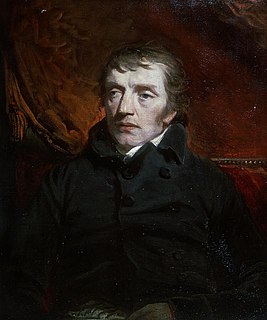A Quote by William Gifford
Countless the various species of mankind, Countless the shades which sep'rate mind from mind; No general object of desire is known, Each has his will, and each pursues his own.
Related Quotes
Each pursues his private interest and only his private interest; and thereby serves the private interests of all, the general interest, without willing it or knowing it. The real point is not that each individual's pursuit of his private interest promotes the totality of private interests, the general interest. One could just as well deduce from this abstract phrase that each individual reciprocally blocks the assertion of the others' interests, so that, instead of a general affirmation, this war of all against all produces a general negation.
... if we take the universe of 'fitting,' countless coats 'fit' backs, and countless boots 'fit' feet, on which they are not practically fitted; countless stones 'fit' gaps in walls into which no one seeks to fit them actually. In the same way countless opinions 'fit' realities, and countless truths are valid, tho no thinker ever thinks them.
Does the open wound in another's breast soften the pain of the gaping wound in our own? Or does the blood which is welling from another man's side staunch that which is pouring from our own? Does the general anguish of our fellow creatures lessen our own private and particular anguish? No, no, each suffers on his own account, each struggles with his own grief, each sheds his own tears.
To the mind which looks not to general results in the economy of Nature, the earth may seem to present a scene of perpetual warfare, and incessant carnage: but the more enlarged view, while it regards individuals in their conjoint relations to the general benefit of their own species, and that of other species with which they are associated in the great family of Nature, resolves each apparent case of individual evil, into an example of subserviency to universal good.
The master in the art of living makes little distinction between his work and his play, his labor and his leisure, his mind and his body, his information and his recreation, his love and his religion. He hardly knows which is which. He simply pursues his vision of excellence at whatever he does, leaving others to decide whether he is working or playing. To him he's always doing both.
[I]t is easy to regard the mind and the body as two slaves trained to obey the imperial soul.... [I]n this trinity of soul, mind, and body, it is sometimes hard to tell which of the three is at work; and the personality of each of the three parties interferes a good deal with that of each of the others. But if you who read will remember that you are an infinite child of God, and can partake of his nature, and that you have given to you the management and direction of your mind and your body, you will be saved many failures.
God is not only to be known in His blessed and incomprehensible being, for this is something which is reserved for His saints in the age to come. He is also known from the grandeur and beauty of His creatures, from His providence which governs the world day by day, from His righteousness and from wonders which He shows to His saints in each generation.
I find one vast garden spread out all over the universe. All plants, all human beings, all higher mind bodies are about in this garden in various ways, each has his own uniqueness and beauty. Their presence and variety give me great delight. Every one of you adds with his special feature to the glory of the garden.
The classification of facts and the formation of absolute judgments upon the basis of this classification-judgments independent of the idiosyncrasies of the individual mind-essentially sum up the aim and method of modern science. The scientific man has above all things to strive at self-elimination in his judgments, to provide an argument which is as true for each individual mind as for his own.
With only one life to live we can't afford to live it only for itself. Somehow we must each for himself, find the way in which we can make our individual lives fit into the pattern of all the lives which surround it. We must establish our own relationships to the whole. And each must do it in his own way, using his own talents, relying on his own integrity and strength, climbing his own road to his own summit.
Each of these [bacterial] species are masterpieces of evolution. Each has persisted for thousands to millions of years. Each is exquisitely adapted to the environment in which it lives, interlocked with other species to form ecosystems upon which our own lives depend in ways we have not begun even to imagine.







































